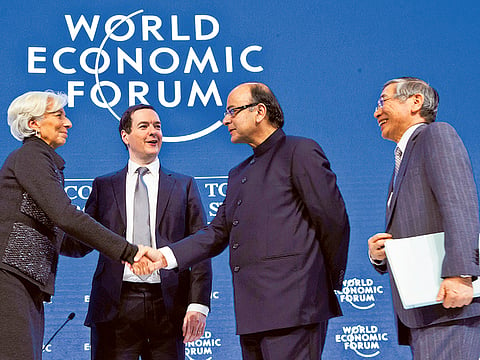Why economic outlook for 2016 is poor
Wide variety of global uncertainties forcing many businesses to think short term

Deep uncertainties about the global economy and volatile commodity prices of which oil is the most prominent, combined with major geopoliticial instabilities and increased dangers of terrorism, have come together to create a very poor business outlook for 2016.
But concerns over the speed of the slowdown in China have dominated discussions at the World Economic Forum. There is no doubt that growth is there, even if the government claims 6.9 per cent and others think 5 per cent might be more realistic, and this is encouraging, but the world got used to thinking of China growing around 10 to 11 per cent so the slowdown has had a powerful effect.
Business worries about China run deeper as President Xi Jinping’s government reveals more of its economic thinking, and so far has failed to address the major structural problems that China needs, as illustrated by the confused response to the Chinese stock market crash.
Ken Rogoff of Harvard said that the struggling emerging markets in particular should be worried about the Chinese slowdown as they rely too much on exporting commodities for which demand is falling, so countries like Brazil and Russia and others which have not diversified or reformed their economies will suffer as commodity prices fall, capital will move elsewhere, and currencies will fall.
India is an exception to this gloomy outlook as reforms have started and its 8 per cent growth looks set to be the global star of 2016.
In stark contrast to previous years at Davos, Europe and North America were not in the frame. They are expected to ride out the year in relative calm and it helps that their exposure to China is fairly small.
Although relatively calm compared to last year’s Greek and euro crises, European growth is still very low with Eurozone growth up to 0.4 per cent from 0.3 per cent. The main concerns in 2016 will be around how the European Union finds a way to become more competitive and rekindle its economies, even if there will be uncertainties created by the UK referendum and continuing Greek adjustments.
Corporate worry
The wide variety of global uncertainties are forcing many companies to think short term, and hold back on investments that are need to both build their prosperity in the future but also break the current mood of growing pessimism.
Sir Martin Sorrell of WPP summed up the list of corporate concerns: Slowdown in China and further worries over whether it will be slow of sharp, the continually changing oil price, the deeply unusual US presidential race, and the continuing flow of migration and refugees,
Paul Singer of Elliott Management took a different line saying that post-2009 crash there has been far too much reliance on central bank action, and not enough structural reform and he wanted to see better policies on issues like tax, education and fostering technology that would have a more permanent effect of growth.
Min Zhu, Deputy Managing Director of the IMF, put some numbers on the corporate uncertainty when he pointed out that there is $7 trillion sitting with the top 500 companies in the S and P list. This huge corporate cash pile is not being invested as companies remain deeply uncertain about the future, he said, adding that the way uncertainty is making companies put their plans on hold is further evidenced by the way that that even when there is lending to corporates, far too much of it goes on mergers or acquisitions, rather than investment.
Sign up for the Daily Briefing
Get the latest news and updates straight to your inbox



